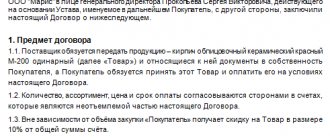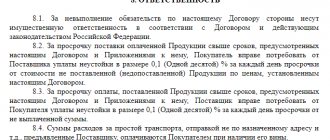When concluding purchase and sale transactions, a number of nuances arise. Therefore, now we will consider the essential terms of the supply agreement under the Civil Code of the Russian Federation: we will figure out which points are considered main and secondary - so that you understand what to focus on and how to formalize the obligation relationship with maximum benefit for yourself.
Note that any contract is a set of clauses agreed upon by the parties. It also contains a preamble, details, legal addresses and is certified by signatures. With a competent approach, it is drawn up taking into account not only current regulations, but also the practice of arbitration courts (in order to prepare in advance for the settlement of disputes). This is in the general case, and we are already moving on to particulars.
Supply contracts
Type
Name
| Equipment supply agreement |
| Contract for the supply of property |
| Supply contract according to INCOTERMS |
| Contract agreement |
| Contract for the supply of building materials |
| Food supply agreement |
| Contract for the supply of a vehicle upon request |
Instructions for preparing a supply agreement in the Contract and Form Designer
A supply agreement is one of the types of a purchase and sale agreement, therefore the general rules of a purchase and sale agreement, provided for in Articles 454 - 491 of the Civil Code of the Russian Federation, apply to it. In addition to these provisions, it is also necessary to take into account the special provisions of the supply contract in Articles 506 - 534 of the Civil Code of the Russian Federation.
According to Art. 506 of the Civil Code of the Russian Federation, under a supply contract, the supplier - seller engaged in business activities undertakes to transfer to the buyer, within a specified period, the goods produced or purchased for use in business activities or for other purposes not related to personal, family, home and other similar use .
Many judges consider a purchase and sale agreement and a supply agreement as two different types, so if you are purchasing goods for business, then you must enter into a supply agreement. Such an agreement protects the interests of the buyer better than a regular purchase and sale agreement, because it allows:
- replace low-quality or incomplete goods or refuse to accept them;
- demand from the supplier reimbursement of expenses for purchasing goods from third parties if the supplier violated delivery deadlines;
- As a rule, it is long-term in nature, in contrast to a one-time purchase and sale agreement.
It is also important that when sold under a supply agreement, trade is considered wholesale, and not retail , as in a one-time sale and purchase, therefore the supplier cannot apply a regime such as PSN. At the same time, the supplier is not obliged to control how the buyer uses the purchased goods: in business activities or for purposes related to personal use.
The tax inspectorate must prove the fact that the seller is illegally conducting wholesale, rather than retail, trade. If it is proven, the seller will have the tax recalculated based on the general taxation system, and penalties and fines will be assessed. PSN payers need to be careful when concluding a purchase and sale agreement with buyers so that it is not re-qualified as a supply agreement.
Results
Thus, the law does not provide for a single unified form of the supply agreement, as well as a sample of this document. However, developing a document for each specific transaction requires following the provisions of the law, which are described in the article. You can download a standard sample contract for the supply of goods on our website.
Sources:
- Resolution of the Plenum of the Supreme Arbitration Court of the Russian Federation dated October 22, 1997 N 18
- Civil Code of the Russian Federation
You can find more complete information on the topic in ConsultantPlus. Free trial access to the system for 2 days.
Features of the supply agreement
A supply agreement is a business agreement, and business entities have the right to conclude it: individual entrepreneurs and legal entities. State and municipal bodies can also be parties to a supply agreement, although their activities are not entrepreneurial. Ordinary individuals cannot be parties to a supply agreement.
A special feature of the supply agreement is the characteristics of the goods - it can be any thing except real estate, currency and currency valuables, securities and things withdrawn from circulation. In addition, goods produced or purchased by the supplier must be purchased by the buyer for business and other purposes other than personal, family and other similar uses.
Another sign of a supply agreement is the presence of a time gap between the signing of the agreement and the delivery of the goods. This is not entirely true. Indeed, most often, the contract is signed first, and then the goods are delivered according to the delivery schedule, but if these two events occur simultaneously, this will not be grounds to recognize the supply agreement as a purchase and sale agreement.
How to conclude a supply agreement
As a general rule, a supply contract will be considered concluded if a simple written form of the transaction is followed . However, the parties may provide for another method of concluding the contract, and if this method was not followed, then the contract may be recognized by the court as not concluded.
For example, it often happens that the parties exchange facsimile copies with the condition of subsequent exchange of original documents within a certain period. Further, in the rush of business, they forget or consider it unnecessary to transfer written originals of the agreement to each other, which is why they are deprived of the opportunity to demand execution of the agreement in court if its terms were violated by a party.
The same thing will happen if the parties indicate in the contract the need for notarization of the transaction (although this is not a mandatory condition of the supply agreement), but they never reach the notary. Such a transaction will be considered void, and therefore not entailing the obligations of the parties.
Let's return to the concept of a simple written form of a transaction. It does not have to be a contract signed by both parties. You can also conclude a supply agreement by sending the buyer a document such as an invoice agreement, if the buyer, after receiving it, performs one of the following actions:
- will transfer funds to the details specified in the invoice;
- send the signed invoice agreement to the supplier;
- will send a letter confirming its agreement with all the terms of the invoice agreement.
It is recommended to use an invoice agreement for simple transactions and small quantities of goods, because it does not allow for many additional terms of the supply agreement.
But even if the parties do not conclude an agreement between themselves in simple written form, it will not be automatically declared invalid or unconcluded, because this condition is not mandatory for the supply contract. And yet, in order to reduce the risks of tax and legal disputes, it is recommended that the supply agreement be concluded in writing in the form of a single document signed by the parties.
For a counterparty - a foreign company: specifics of verification
A specific feature of working with foreign companies is checking information from foreign sources.
Therefore, in order to conclude a contract, they must provide the following documents for verification:
- On registration of a company or individual entrepreneur on the territory of the relevant foreign state.
- Verification of the right of the person signing the paper to conclude a transaction.
- Certified translation of all submitted papers.
For better verification, we repeat the list of statutory documents for concluding agreements with legal entities.
Apart from these additions, the verification is identical to the verification of a domestic counterparty.
Terms of the supply agreement: essential and ordinary
The main content of any contract is its terms agreed upon by the parties. Let's take a closer look at what conditions must be specified in the supply contract for it to have legal force.
According to the degree of importance, the terms of the contract are divided into two groups: essential and ordinary. Essential terms are required to be included in the text of the contract, because only after the parties reach an agreement on such terms will it be considered concluded.
First of all, it is necessary to agree on its subject matter in the supply contract. Considering that the supply agreement is largely subject to the rules applied to the purchase and sale agreement, the main essential condition of the supply agreement will also be the condition regarding the goods, which is put forward by Art. 455 (3) of the Civil Code of the Russian Federation, namely its name and quantity. From this condition it should be clear which goods the seller must transfer to the buyer.
The name of the product should not have a general formulation such as: “food”, “fuels and lubricants”, “consumer goods”, “medicines”, etc. There is an All-Russian Classifier of Products, which divides goods into classes, groups, types and varieties.
For example: class of goods – “Food industry products”, group – “Flour confectionery products”, type – “Cakes”, variety – “Sponge cakes”. To consider the name of a product as agreed upon by the parties, it is necessary to indicate the classification of at least the type of product.
In addition, there is an even narrower division of goods by model, brand, variety, and article number. The name of the product can also be indicated in accordance with international and national standards in force in the Russian Federation (GOST, TU, Technical Regulations, etc.) or in accordance with the documentation attached to the product (technical passport, certificate of conformity, warranty card).
It is advisable to indicate the fullest possible name of the product, because if its definition is not sufficiently specific, there is a risk that the contract will be recognized as not concluded due to a lack of agreement on its subject matter. In order not to overload the text of the supply contract itself with a description of the product, an appendix is often drawn up to it - a specification.
As for the quantity of goods, clause 2 of Art. 465 of the Civil Code specifically stipulates that “ if the purchase and sale agreement does not allow determining the quantity of the goods to be transferred, the agreement is not considered concluded .”
The quantity of goods to be supplied can be set in different units - pieces, units of measurement of length, weight, volume, area, etc. If in doubt, in order to correctly indicate the units of measurement of quantity, you can refer to the All-Russian Classifier of Units of Measurement.
The condition on the quantity of goods will also be considered agreed if at the time of conclusion the contract does not indicate a certain quantity, but the procedure for determining it (clause 1 of Article 465 of the Civil Code of the Russian Federation). The procedure for determining the quantity can be agreed upon, for example, in a situation where the product to be supplied has not yet been produced by the supplier, and its exact quantity is unknown at the time of concluding the contract. In this case, the quantity condition may look like this: “The Supplier undertakes to supply goods to the Buyer monthly in the amount of 75% of the products produced per month.”
Unlike the general sales contract, another essential condition of the supply contract is the delivery time . The importance of this condition is easy to understand if we consider that the parties to the supply agreement are engaged in business activities, and the goods supplied will be used in production or further resale, which entails the buyer’s obligations to his counterparties.
Failure to meet delivery deadlines by the supplier can lead to serious consequences for the buyer, therefore, the Civil Code regulations governing the supply contract stipulate a special opportunity for the buyer to purchase undelivered goods from other persons with all necessary and reasonable costs for their acquisition charged to the supplier (Article 520 of the Civil Code RF). In this regard, one of the important applications of the supply agreement will be the delivery schedule or calendar.
In addition to the above conditions on the subject of the contract, the name and quantity of the goods, and the delivery period, the essential conditions of this type of contract also include all other conditions that one of the parties requires to be included in the contract (Article 432 of the Civil Code of the Russian Federation).
In practice, these are the conditions that allow us to most fully describe the characteristics of the product:
- price and payment procedure;
- product quality and warranty period;
- assortment and completeness;
- documentation attached to the product;
- delivery conditions and the risk of accidental loss of goods.
Thus, if the counterparty requires certain conditions to be included in the contract, then the parties must ultimately agree on such issues, for example, accept such conditions, or refuse them, or change them in some way. You can’t just pretend that your partner didn’t say anything like that, because... he may refer, for example, to pre-contractual correspondence. If agreement on the disputed provision is not reached, then the contract is considered not concluded.
The usual terms of the supply contract include:
- rights and obligations of the parties;
- contract time;
- liability of the parties;
- Force Majeure;
- modification, termination and termination of the contract;
- settlement of disputes.
Acceptance by quantity
Acceptance by quantity
has a number of features. Goods arriving without containers, in open containers and in damaged containers must be accepted by quantity at the time of their receipt from the supplier or from the transport authority. Acceptance from transport authorities is carried out in accordance with the rules in force in transport. If the goods are delivered to their destination by a transport authority, the buyer first of all accepts them from the carrier. If damage or shortage of cargo is detected, the recipient is obliged to request that the transport authority draw up a report or other documents provided for by transport rules. The report serves as important evidence that the cargo does not comply with the data of the accompanying documents.
In case of receipt of delivered goods from a transport organization, the buyer is obliged to check the compliance of the goods with the information specified in the transport and accompanying documents, as well as accept these goods in compliance with the rules provided for by transport legislation.
The buyer must create conditions for checking the received goods that ensure their safety and prevent the possibility of shortages, theft and damage, monitor the serviceability of testing, measuring, weighing equipment, and ensure that those performing acceptance understand its rules well.
Acceptance by quantity means establishing the exact quantity of goods received by the buyer. The verification must be carried out using the same quantity determination method as was used by the supplier upon shipment. The mass of goods in containers is the gross mass, the net mass without containers is the net mass. Net weight is determined by emptying containers and weighing the goods without containers.
Early termination of the supply contract
The need to terminate the supply contract before the end of its validity period may arise for both the buyer and the supplier. The buyer may be dissatisfied with the low quality of the goods, incomplete shipments, or delays in delivery. Supplier claims may result in repeated violation by the buyer of payment terms for goods or conditions for sampling goods.
Early termination of a supply agreement may occur on the following grounds:
- Agreement of the parties. Termination on this basis is possible unless the supply agreement contains a prohibition on this. The agreement is drawn up in writing and signed by both parties. If the supplier does not sign the termination document, but fulfills the terms of the agreement through his actions (for example, returns money for a low-quality product or takes back an incomplete product from the buyer), then it is considered reached.
- Unilateral refusal to fulfill the contract . This possibility is provided for in Art. 523 of the Civil Code of the Russian Federation and may be additionally specified in the contract. The supply contract will be considered terminated due to the fact that one of the parties refuses to perform it if the other party significantly violates the contractual terms. To comply with the unilateral refusal procedure, the party who refuses to perform the contract must notify the other party in writing.
- Judicially . To terminate a supply contract in court, a party must file a claim in an arbitration court, but before that, measures must be taken to resolve the dispute out of court (Article 452 of the Civil Code of the Russian Federation). The demand for termination of the contract must be sent to the other party, and only if the party refuses to terminate or does not respond, a claim can be filed in court. The period for receiving a response is generally 30 days, but may be different as specified in the contract.
Increasing factor
It is impossible to apply an increasing factor to the standard when calculating payment for CG in the following cases:
- to persons who accepted the premises under an act from the developer (clause 2, part 2, article 153 of the RF Housing Code) and the developer (clauses 7.2 and 7.4 of article 155 of the RF Housing Code);
- to the landlord of the premises for social rent or specialized housing stock (clauses 1 and 3 of part 2 of Article 153 of the Housing Code of the Russian Federation), to the tenant of the premises (clause 2 of part 2 of Article 153 of the Housing Code of the Russian Federation);
- to the owner of premises in a dilapidated, emergency facility, a facility subject to demolition or major repairs before 2013, as well as a facility where the power consumption of electrical energy is < 5 kW, the maximum volume of thermal energy consumption is < 0.2 gCal per hour, the maximum volume of natural gas consumption < 2 m³ per hour.
An increasing factor to the established standard can be applied provided that it is technically possible to install the ODPU; in the absence of such a possibility, the increasing factor cannot be applied.
What to do if the buyer refuses to accept the goods under the supply agreement
If the buyer refuses to accept the goods, then the supplier not only risks not receiving payment for it, but is also forced to store it, i.e. incur additional costs. The buyer’s obligation to accept the goods under the concluded supply contract is a mandatory norm, therefore the buyer can refuse to accept the goods only if there are compelling reasons . Such reasons may be:
- The deadline for receiving the goods has not yet arrived;
- the deadline for delivery of the goods was violated, and the buyer managed to refuse it in writing;
- the supplier transfers the goods without the required accessories or documents;
- the range of goods does not correspond to the supply agreement;
- the goods are over-delivered;
- the requirements for the quality or completeness of the goods are violated;
- the goods are transferred in improper containers or packaging or without it at all (in cases where the safety of the goods requires containers or packaging).
In addition, the buyer may refuse the goods if he has the right to demand its replacement or refuse to fulfill the delivery agreement.
If the buyer’s refusal to accept the goods is not due to such compelling reasons, then the supplier has the right to legally demand that the buyer accept and pay for the goods; compensation for losses caused by failure; refuse to fulfill the supply agreement.
The buyer's refusal of the goods must be proven in court with documents (a letter from the buyer confirming the refusal, or an act in which the buyer justifies his refusal by violations of the contractual terms by the supplier). At the same time, the supplier must also prove the groundlessness of the refusal, for example, by conducting an independent examination of the quality of the product if the refusal is caused by inadequate, in the buyer’s opinion, quality.
The buyer bears responsibility not only if he unreasonably refuses to accept the goods, but also if he evades its acceptance: does not show up to pick up the goods (even though he was notified of this) or hides his real address if delivery of the goods to the buyer is agreed.
If the court finds that the buyer refused or evaded acceptance of the goods without valid grounds, then payment for the goods and the supplier's losses caused by the refusal will be recovered in court. In response, the supplier is obliged to provide the buyer with the goods paid for in court.
Cost of the Kyrgyz Republic
The cost of a utility resource is calculated according to the tariffs established by the legislation of the Russian Federation (clause 22 of the Russian Federation Regulations dated February 14, 2012 No. 124). The cost of the communal resource, which is used to maintain common property in the house, is calculated using prices that are set for the population. If any surcharges are established on tariffs, then they should also be taken into account when calculating the cost of the Kyrgyz Republic. If all IPU in apartments and DPPU in a house allow the use of different tariffs, for example, depending on the time of day and have the same functionality, then the cost of the Kyrgyz Republic, which is consumed when using common property, is calculated taking into account these features; in other cases, the cost is calculated excluding differentiated tariffs. If the RSO supplies a resource of inadequate quality or with interruptions that exceed the established duration, then the cost of the CR should be revised for this period. In some cases, the cost of a utility resource is calculated according to the standard, but using an increasing factor:
- if there is an obligation and technical ability to install the ODPU, but it is not installed;
- if the ODPU has failed or its service life has expired, but 3 months have passed and its operation has not been restored;
- if the utility service provider does not provide information about the ODPU readings within the established time frame;
- if the executor of the control system 2 or more times did not allow representatives of the RSO to check the condition of the metering device.
If there is a technical inspection report that confirms that it is not possible to install the ODPU, then the increasing factor is not applied.
A coefficient of 1.5 is used when calculating the cost of hot water, cold water and electricity consumed for the maintenance of common property
For thermal energy, the increasing factor is 1.1.
What to remember about the supply agreement
In this article, we examined the specific terms of the supply contract, without affecting such terms that can be called general contractual ones. Considering that our main audience is young entrepreneurs, we suggest limiting ourselves to the necessary minimum information about the supply agreement, and, as always, we will try to answer any questions that arise in the comments to the article.
- The parties to the supply agreement cannot be ordinary individuals.
- The buyer must use the goods purchased under the supply contract for purposes not related to personal consumption, and the supplier is not obliged to control the buyer’s compliance with this condition.
- The sale of goods under a supply agreement is wholesale trade, therefore the supplier cannot apply the PSN.
- Considering that the supply agreement is most often ongoing (that is, the delivery of goods occurs not simultaneously, but in stages), it is recommended to conclude the agreement in the form of a single document signed by the parties, and not be limited to an invoice agreement or delivery notes.
- The essential terms of the supply agreement are the terms of the product (full name and quantity) and the delivery time of the product, which are recommended to be drawn up as appendices to the agreement.
- The buyer is obliged to accept the goods; he can refuse acceptance only if there are compelling reasons. In case of unlawful refusal of goods, the buyer must compensate the supplier for the losses incurred by him.
- If the supplier fails to meet delivery deadlines, the buyer has the right to purchase undelivered goods from third parties and demand reimbursement of these costs from the supplier.
Payment for the Kyrgyz Republic in RNO
If the owners of premises in an apartment building at a general meeting decided to pay the payment directly to the RSO, then it must be stated in the agreement (clause 25 of the Russian Federation Regulations dated February 14, 2012 No. 124).
- the procedure, timing and form in which the RSO will provide information to the MA about payments received from consumers;
- the procedure, timing and form in which the RSO will provide information about the contractor’s debt to pay for the Kyrgyz Republic separately for consumer payments and for payments for the corresponding utility service that was used to maintain the common property;
- the condition that when reconciling calculations, the accruals, amounts of payments and debts of the contractor in terms of fees for utilities for the maintenance of common property and fees for consumers’ utilities are indicated separately;
- how will the RSO and the MA interact when suspending or terminating the supply of a utility service to those consumers who have debts;
- the CG performer must be responsible for failure to comply with the requirements of the RSO to limit or terminate the supply of a resource to a consumer who is in debt, if there is such a technical possibility;
- payment procedure.
Source: RosKvartal® - Internet service No. 1 for management organizations









